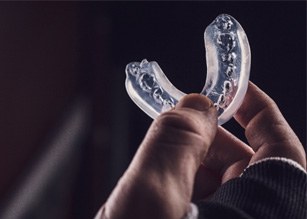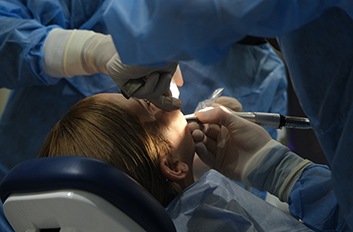Brooklyn, NY 11222
Dental Implants – Brooklyn, NY
Replacement Teeth That Mimic Nature
Dental implants are a relatively modern advancement that have quickly risen to become the golden standard of tooth replacement. At Brooklyn City Dental, our highly skilled dental team is able to restore the entire structure of missing teeth, including the roots, within the comfort of our own dental office. Not only does this mean you won’t have to travel between specialists, but you’ll also get to stick with the same, trusted providers that you started with. Schedule a consultation today to learn how we can provide you with a smile that looks as natural as it feels thanks to dental implants in Brooklyn!
Why Choose Brooklyn City Dental for Dental Implants?
- Start-to-Finish Dental Implant Care
- CT Scanner for Better Treatment Planning
- Flexible Dental Financing Available
- Experienced & Multilingual Dental Team
Real Patients. Real Smiles
What Are Dental Implants?

Dental implants are short, titanium posts that we can surgically place below the gumline and into the jawbone to reconstruct the missing root structure of teeth. Due to their biocompatibility, they’ll naturally fuse with the jawbone through a process called osseointegration, providing a strong, stable, and unwavering foundation for restorations like bridges, crowns, and dentures to be attached to. Because they provide the bone with stimulation and blood flow, this treatment is able to prevent bone erosion that can lead to changes in facial shape.
Dental Implant Candidate Quiz
Dental implants are widely considered the premier way to replace any number of missing teeth, but are they right for you? Determining if someone is a good candidate for this treatment involves multiple individual factors, and to help you get a better idea of where you stand, you can take the short quiz below. After you have completed it, you can give our office a call for a free consultation.
The 4-Step Dental Implant Process

The process for receiving dental implants is inherently lengthier and a little more complex compared to traditional options like dentures or bridges. However, this process is very worthwhile given all of the benefits that dental implants have to offer, including their impressive lifespan and remarkable functionality. That said, our team is happy to walk you through this process in detail so that you can comfortably commit to rebuilding your smile with this premier restorative solution! Here’s a brief overview of the four main steps of the dental implant process:
Initial Dental Implant Consultation

During your initial consultation, our team will carefully examine your mouth and facial structures to determine if dental implants are a viable option for you. We’ll be looking at your jawbone density to ensure that the bone is strong enough to support the implant posts, as well as screening your oral health to ensure there aren’t any underlying issues that might negatively affect your implants. Once we’re able to clear you for implants, we can schedule your surgery.
Dental Implant Surgery

We’re excited to be able to complete the entire implant process in-house, meaning that you’ll be conveniently working closely with the same team under the same roof the whole time. As for the procedure itself, it’s quite straightforward; we’ll numb your mouth before making small incisions into your gum tissue to access your jawbone, where we’ll then place as many implant rods as needed. The gums are sutured shut and protective caps are placed over the posts so that they aren’t disturbed as your mouth heals.
Dental Implant Osseointegration & Abutment

The implant posts will need a few months (anywhere from three to six) to fuse with your jawbone; this part of the process is known as osseointegration, and it’s pretty important since it ensures the future success of your restorations. Patients will have to follow a very specific set of recovery guidelines during this period to ensure that things heal up properly. Once the posts have successfully fused with your jaw, you’ll come back to receive abutments, which your final restorations are attached to.
Delivery of Dental Implant Restoration(s)

A few weeks after your abutments have been placed, we’ll call you back in to attach your custom restorations. These replacement teeth will be designed based on precise impressions of your smile, meaning they’ll look, feel, and function identically to your original teeth. Once they’ve been placed, we’ll make sure everything looks right and your bite is correct before sending you on your way with your brand-new, complete smile!
Benefits of Dental Implants

Dental implants are by no means the only form of tooth replacement available, but they do offer all kinds of benefits. The more you learn about the advantages that dental implants can provide, the easier it is to see why so many patients are turning to them to re-complete their smiles. If you’re still trying to decide whether dental implants are worth pursuing, read on to learn about some of the benefits that they provide.
Day-to-Day Benefits

Just like your natural teeth, your dental implants will play an important role in everyday tasks such as speaking and chewing. As such, you will enjoy the following benefits on a daily basis:
- Improved Confidence: Dental implants can give your self-esteem a boost in a number of ways. For one thing, they look and feel natural, making it easier to smile without hesitation. On top of that, you’ll never need to worry about your new teeth slipping or sliding out of place.
- A Varied Diet: Thanks to their stability, dental implants can handle most foods, meaning you can enjoy your favorite meals again without restriction.
- Easy Maintenance: Traditional dentures require you to buy specialized products to take care of them. In contrast, dental implants can be brushed and flossed as if they were natural teeth.
Health Benefits

Dental implants can help improve your smile, but they also come with a number of key health benefits:
- Jawbone Preservation: You may have heard that the jawbone tends to deteriorate when teeth are missing. Dental implants are the only type of tooth replacement that can prevent this bone loss from happening.
- Improved Nutrition: It’s harder to maintain a healthy diet when there are limits on what you can eat. Fortunately, dental implants let you eat virtually any food, making it easier to fulfill your nutritional needs.
- Keeping Natural Teeth Safe: Once tooth loss occurs, the remaining teeth may start to drift out of their proper positions. A dental implant can fill the empty space so that you don’t have to worry about future alignment issues.
Long-Term Benefits

You’ll start to appreciate your dental implants even more as the years go by thanks to these long-term benefits:
- A High Success Rate: Dental implants that have been in the mouth for 10 years have a success rate of 95%. In other words, you can generally count on dental implants to stay successful for a long time.
- Longevity: Dental implants last far longer than traditional forms of tooth replacement. Some patients are even able to keep the same dental implants for the rest of their lives.
- A More Youthful Appearance: Missing teeth are often associated with a sunken, aged appearance, but dental implants can go a long way toward helping you look younger.
Who Dental Implants Can Help

Almost anyone can get dental implants in Brooklyn, no matter how many teeth they've lost. It doesn’t take much to qualify for these special posts. Still, you ought to consult our dentists before you decide anything. They’ll examine your smile to see if implants suit you. From there, our dental team will draft a custom treatment plan just for you. The details are simple enough to sort. To learn more, please keep reading or call our office.
Who is a Good Candidate for Dental Implants?

So long as you’re a healthy adult, you can get dental implants. These prosthetics don’t tend to have many requirements. However, they do benefit some patients more than others. The best candidates for dental implants have these three traits:
- Good Overall Health – Implant placement is a surgery, so your body must be decently healthy to bear it. Your treatment will lead to complications otherwise.
- Great Oral Health – When they aren’t addressed, dental issues like cavities and gum disease cause implant failure. A dentist should treat them before your implant surgery.
- Proper Jawbone Density – Your jawbone needs proper strength and density to support dental implants. If it’s too weak, your new teeth will become unstable and fail.
Even if you lack the qualities above, there’s no need to worry. You can become a good implant candidate through certain dental services. These preliminary procedures may include tooth extraction, gum disease therapy, or bone grafts. Once you’ve had them, your jaw will have the density needed to handle implants.
Missing One Tooth

When you’re missing just one tooth, the best solution is a single implant and crown. This pair will blend with adjacent teeth to ensure seamless results. Its effects should also last a good while – the average implant has a longer lifespan than a dental bridge. Plus, an implant-crown pair is non-invasive. Placing them doesn’t require the dentist to alter other teeth. (Such alterations can weaken a tooth and make it more sensitive.)
Missing Multiple Teeth

You’d likely benefit from an implant bridge if the missing teeth are consecutive. After all, this device relies on two dental implants fused to a pontic (i.e., artificial tooth). It can replace several chompers at once without using abutments. In other words, placing it doesn’t involve any enamel removal.
If you’ve lost teeth throughout your mouth, a partial implant denture would work well. It’d use several implant posts to anchor itself in place.
Missing All Teeth

Once you’ve lost all your natural teeth (or soon will), you may want to try an implant denture. It uses four to six implants to restore an entire arch of pearly whites.
Of course, an implant denture has advantages over a normal one. That it has dental implants means it won’t slip or fall from your mouth. Better yet, it’ll restore your bite force to help you chew tough foods. This sort of denture is also long-lasting. Unlike regular ones, it can work for a lifetime and save you money on repair and replacement work.
Understanding the Cost of Dental Implants

While it’s true that dental implants have a higher up-front cost than traditional dental restorations, they offer countless priceless benefits that patients will agree makes them well worth the investment. The cost of dental implants is largely based on various factors our team will discuss with you during your initial consultation. Dental implants are highly customized, so prices can vary dramatically depending on your needs. During your visit with us, we can discuss exactly how much it will cost and the different financial options available. Until then, here are some things to take into consideration.
Preliminary Treatments & Dental Implant Surgery

Preliminary treatments, like gum disease therapy, tooth extractions, and bone grafting, are sometimes necessary and will add to the overall cost of your treatment. However, these preliminary treatments are vital for maximizing the success of your new smile. Fortunately, many of them are partially covered by dental insurance. We conveniently provide the entire treatment process under one roof, so you don’t need to worry about working with an outside specialist and needing to pay separately for the surgery.
The Parts of Your Dental Implant

Here are some of the most prominent factors we look at to determine the cost of your treatment:
- Number of Implants: Depending on the number of teeth that you are missing and where they are located in your mouth, you will need more or fewer dental implants. The more implants you need, the higher the cost.
- Type of Restoration: Crowns, bridges, and dentures all have different costs. In most cases, the smaller the restoration you get, the lower the cost is.
- Material Used: Implants are usually made from titanium, but they can also be made from zirconia. These materials are at different price points.
- Brand of Implants: Dental implants come from a variety of different manufacturers. This will influence their costs.
How Dental Implants Can Save You Money

It can be tempting to try to save money by opting for an alternative tooth replacement option. Dental bridges and dentures are great for some people, but dental implants provide benefits you can’t get anywhere else. They can even help you save money in the long run. You don’t need to worry about paying for replacements every 5 to 7 years like you would for dentures, you don’t need to stock up on denture adhesives or cleansing solutions. Dental implants also help to prevent dental issues from arising, ultimately helping you avoid the need for costly treatments that add up over time.
Does My Dental Insurance Cover Dental Implants?

Dental insurance plans often don’t cover the cost of dental implants, but there are some exceptions. Parts of the final or preliminary treatments are often covered. Our team is happy to work with you to understand what is and isn’t covered before your treatment begins. This way, we can fully maximize your coverage.
Making Dental Implants Affordable

If you don’t have dental insurance, this doesn’t mean you will be left completely on your own. With our In-House Dental Savings plan, patients can save on treatments and procedures completed at our practice. We also work with CareCredit and Alpheon. These are third-party financing companies that can help to split the cost of your treatment into manageable monthly installments. To learn more about your financing options, don’t hesitate to reach out to one of our friendly team members.
To find out exactly how much you can expect your implants to cost, schedule a consultation with us. We’re eager to help you get your smile back!
Advanced Dental Implant Procedures

Successful dental implant treatment often involves more than a placement surgery and design of beautiful new teeth. Often, patients require additional procedures that prepare their mouth to successfully support their implants. If you find out that you need one or more of these preliminary treatments, do not be discouraged. Although it might extend your total treatment timeline, it can provide remarkable results that help you enjoy a strong and healthy smile for many years to come.
Bone Grafting

In order for your dental implants to be successful, they need adequate support in your jawbone. If a scan reveals that your bone is not quite thick enough or large enough to provide a sturdy base for your new teeth, you might need a bone graft.
During this procedure, we carefully expose the jawbone and add material in order to fortify and enlarge it. The grafted material may be natural or synthetic bone. After it is put in place, we close any incisions, and then your body can start to integrate the new material.
In some cases, a bone graft can be performed at the same time as dental implant placement. In other instances, there must be a waiting period of several months between the two procedures.
Sinus Lift

Your upper jaw is located just beneath your sinuses. If the bone in that area is too thin, dental implants might go all the way through it and end up penetrating your sinus membrane! If we determine that is a risk in your case, we may recommend that you undergo a special type of bone graft known as a sinus lift.
During a sinus lift, we carefully access the sinus membrane through the upper jaw. We gently move it upward and then place a block bone graft beneath it in order to keep it in its new place.
In most cases, a waiting period of 4 – 9 months is necessary after a sinus lift. Following that period, you may be able to receive dental implants.
Ridge Expansion

We often say that dental implants get placed in the jawbone. While that is true, it is possible to be even more specific. They actually get placed in an area of the bone known as the alveolar ridge. If that ridge is too narrow for dental implants, you might need a procedure known as ridge expansion (also called ridge augmentation).
During this surgery, we carefully place a wedge in the ridge in order to divide the part that faces your tongue from the outer part. Then, we place a bone graft in between them. After you heal from this surgery, your alveolar ridge should be both strong enough and wide enough to provide an adequate base of support for dental implants.
Dental Implant Post-Op Instructions

After our team carefully places your dental implants into your jawbone, you will need to go through a recovery period. While that might sound intimidating, it is really nothing to worry about. We will give you all the instructions you need to facilitate a smooth healing process. Below, you will find information about what to expect during the post-op period.
What to Do Directly After Dental Implant Surgery

After your surgery, blood clots should start to form at your dental implant sites. They play a key role in your body’s healing process, so you should take the following steps to protect them:
- Do not spit. Instead, swallow extra saliva or use a tissue to absorb it.
- Do not smoke or use drinking straws. The suction action might dislodge your blood clots, and smoking slows down your body’s healing.
- Do not touch your surgical sites. Touching your implant sites with your tongue or fingers could endanger your blood clots.
Common Side Effects When Recovering from Dental Implant Placement

During the initial part of your recovery period, you might experience:
- Intermittent bleeding. This is usually mild and can be managed with gauze and light pressure.
- Swelling may worsen over the initial 72 hours and can last for more than a week. Cold compresses can keep it under control.
- General discomfort. Pain relievers and rest can help to minimize discomfort.
If you experience any severe or unusual side effects while you are healing, contact our team right away for assistance.
Your Diet After Dental Implant Surgery

At first, you should adhere to a no-chew diet, which can include things like brothy soups, protein drinks, pudding, and applesauce. You can even indulge in a little ice cream! Then, you can move on to fork tender foods, like well-cooked pasta, scrambled eggs, and meatloaf. When you feel up to it, you can resume a fairly normal diet. However, you should continue to be very careful around your implant sites.
Post-Op Health & Oral Hygiene

The day after your surgery, you can brush your natural teeth as usual. However, you should take care not to disturb your surgical sites. If you have a prescription mouthwash, use it as directed (if you use nonprescription mouthwash, do not choose a product with a high alcohol content). Regularly swishing with warm salt water is also a good idea because it can help to reduce soreness and inflammation.
What to Do After Your New Teeth Are Attached

After your crown, bridge, or denture is attached to your implants, you will not have to worry about any downtime. You might experience minor sensitivity or soreness in your gums, but it should pass within a few days. You can start to enjoy the benefits of your restored smile right away!
Maintaining & Caring for Your Dental Implants

Dental implants have an astonishing success rate of over 95%! However, to reap all of the benefits of your replacement teeth for decades, it is important that you take all of the proper steps to care for them. Continue reading to learn which healthy habits you should implement to keep your dental implants in excellent shape.
Make Oral Hygiene a Priority

Your dental implants may not be susceptible to cavities, but the teeth around them still are. Your gums are also still at risk for gum disease which can be detrimental to your replacement teeth. You should continue to maintain an excellent oral hygiene regimen. Remember to brush twice, floss, and rinse with mouthwash daily.
Break Bad Habits

Bad habits can cause a variety of issues for your teeth and dental implants if you aren’t careful. It is best to refrain from smoking cigarettes and using other tobacco products. These can slow healing and make it more challenging for your immune system to fight off infections. You should also avoid using your teeth to open bottles, rip through packaging, or complete other tasks. Instead, find the appropriate tool so you don’t cause damage to your teeth.
Protect Your Dental Implants

Dental implants are very resilient and can last for several decades, but they aren’t completely indestructible. You should always wear a mouthguard when playing contact sports. If you grind your teeth at night, you may want to ask your dentist about getting a nightguard to protect your replacement and natural teeth from additional wear and tear.
Schedule Regular Dental Checkups

You should continue seeing your dentist for regular cleanings and checkups twice each year. This way, we can monitor your dental implants, natural teeth, gum tissue, and more. By detecting issues early on, we can address them quickly and may even be able to prevent serious complications from developing in the future.
Expands Opportunities

Making a good impression is key when you are attending interviews, negotiating sales, and attending social gatherings. Your smile is one of the first things that people notice about you, so having teeth that appear healthy will do nothing but help you. Studies have found that the probability of being employed is negatively associated with poor dental health.
Dental Implant Technology

Dental techniques and technology become more and more advanced every year. Today, we use a wide range of techniques to make dental implant placement as successful and go as smooth as possible. Continue reading to learn about some of the advanced pieces of technology that we use here at Brooklyn City Dental.
3D Cone Bean Imaging/3D CT Scanning

Dental X-rays are used to help dental professionals see the oral structure of the mouth that are hidden and difficult to see with the naked eye. This includes the roots of the teeth and jawbone. However, X-rays can’t detect everything. That’s why we use a 3D cone beam scanner. This piece of technology shows us the important details that aren’t visible with a digital X-ray. This includes nerve pathways, blood vessels, and thickness of your jawbone. With this scanner, we can plan where your dental implant should be placed for the highest possibility of success.
Guided Dental Implant Surgery

Using the CBCT scan of your mouth, we can create a 3D-printed surgical guide. This gives us a clear indication of where your dental implants need to be placed. It also provides enhanced precision that makes your treatment more comfortable and reduces inflammation at bruising. Treatments performed with a surgical guide also tend to require smaller incisions, meaning an easier recovery time following your surgery!
Digital Impression System

If you have ever gotten orthodontic treatment or a dental crown, you likely remember the gooey putty that you had to bite down on to make your impressions. Fortunately, this is a practice of the past. Today, we use digital impressions. They are much easier to take and produce highly accurate and reliable images. This simplifies the process of providing patients with high-quality, perfectly fitting restorations.
Dental Implant FAQs
Am I Too Young to Get Dental Implants?
While any adult can get dental implants, they do have a minimum age requirement. Child and teen patients are simply too young for them.
You see, most people’s jaws don’t fully develop until their early adult years. Dental implants won’t work well before that period. If they’re placed while the jaw is growing, they’ll interfere with bone development and cause adverse effects. Therefore, most dentists won’t place implants in patients under 18 years old. Some even view the mid-20s as the earliest acceptable age for placement.
Will I Have to Take Off Work for Dental Implant Surgery?
Yes, you’ll need to take off work for dental implant surgery. Doing so ensures your treatment goes well and that you recover properly. That said, the days off needed vary by patient; every case differs.
Often, patients only need to take one or two days off for dental implant surgery. That period is long enough for any anesthetics or sedatives to wear off. Also, it gives you enough time to adjust to your new implant(s).
Still, there are exceptions. You may need more days off if your job is physically demanding. Without enough recovery time, heavy exercise could divert blood from the implant site and delay healing. So, you may want to book your surgery on a Thursday or Friday.
Do Dental Implants Decay?
Thankfully, no – dental implants don’t decay. They’re not made of enamel that erodes from bacterial acids. However, you’ll still need to clean them and the rest of your smile.
Remember, oral issues can make your implants fail. Nearby cavities and gum disease would upset the tissues that support them. If left unchecked, such problems will loosen your implants until they fall out.
To avoid that outcome, you must practice good oral hygiene. So, remember to brush your teeth twice daily and floss between them once daily. These habits will ensure your dental implants stick around for a long time.
Do Dental Implants Make You Look Younger?
As a matter of fact, yes – dental implants do make you look younger. Their effects will rejuvenate
It comes down to how implants affect your jaw. Once placed, they’ll stimulate your jawbone to recover and preserve its bone tissue. These processes then help your face look fuller and less hollow. In contrast, failing to address your smile gaps would cause your jawbone to erode. The result would be a face with wrinkled skin and lines around your mouth.
For more details on how dental implants will affect your face, consult our dentists. They’ll gladly explain what to expect from your treatment.
How Long Do Dental Implants Last?
The lifespan of dental implants mostly depends on the health and lifestyle choices of the patient. To ensure that dental implants last, you must brush twice, floss, and rinse with mouthwash on a daily basis. Attend routine cleanings and checkups, avoid chewing on anything too hard or sticky, and don’t use your teeth as tools. Smoking has also been linked to dental implant failure. With proper maintenance, dental implants can last upwards of three decades. This is several times longer than bridges and dentures.
Does Getting Dental Implants Hurt?
Many people are hesitant to commit to dental treatment because they are worried that the procedure will be painful. Fortunately, this isn’t the case. Your mouth will be numbed with a local anesthetic before the procedure begins. The jawbone also doesn’t have very many nerve endings, so you shouldn’t encounter any pain during the placement. You may experience some soreness for a few days afterward, but this can be managed with your over-the-counter and prescribed pain relievers.
What Can Cause Dental Implants to Fail?
Dental implant failure is uncommon, but it can happen in some circumstances. The most common cause of dental implant failure is peri-implantitis. This is a form of gum disease that develops from poor oral hygiene and can damage the bone and gums supporting the implant. In other cases, the implant may fail to integrate with the jawbone – particularly if the patient had low jawbone density to start. Your dentist will provide you with guidelines to minimize your risk of implant failure.
Can I Get Dental Implants If I’m Diabetic?
If your diabetes is under control, your odds of dental implant success are comparable to someone who isn’t diabetic. However, uncontrolled diabetes can slow down the healing process, making it difficult for the implants to integrate with the jawbone. If you are interested in getting dental implants, talk to your endocrinologist about getting your blood sugar levels under control beforehand. This way, dental implants could be in your future!



